News
ICI Assembly Tackles the Role of CGF Projects in Industrialists’ Access to Finances
- 28.12.2016
- News
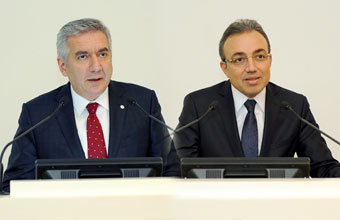
The ordinary monthly assembly meeting of the Istanbul Chamber of Industry (ICI) for December, also featuring the 2017 budget discussions, was held on December 28, 2016 at Odakule Assembly Hall under the main agenda of “The Role of the Credit Guarantee Fund Vision and Projects in Turkish Industrialists’ Access to Finances”. İsmet Gergerli, General Manager of the Credit Guarantee Fund, was the guest of the monthly Assembly meeting chaired by Zeynep Bodur Okyay, ICI President of Assembly. Before setting about the main agenda, Sadık Ayhan Saruhan, ICI Board Treasurer presented the 2016 budget realization figures. Assembly members then approved ICI’s budget for 2017.
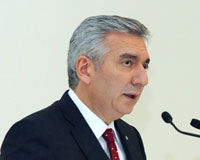
Erdal Bahçıvan, ICI Chairman
In his speech on the Assembly agenda, ICI Chairman Erdal Bahçıvan pointed out the hardships faced by SMEs in accessing finances. “For Eximbank loans, banks must shortly pass on the flag to the Credit Guarantee Fund in issuance of letter of guarantees,” he continued. “The amounts of suretyship and guarantee impose a major financial burden on both the banks and the companies. Involvement of the Credit Guarantee Fund will lighten the load of suretyships, offering new sources of credit to the real sector,” stated Bahçıvan.
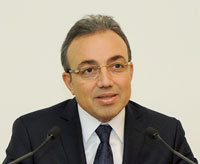
İsmet Gergerli,
General Manager of CGF
İsmet Gergerli, General Manager of CGF, gave a presentation to ICI Assembly Members and answered their questions. He extended his gratitude for bettered conditions of CGF as well as the Breathing Loan developed by TOBB (The Union of Chambers and Commodity Exchanges of Türkiye) -led NGOs including ICI, he noted: “The Breathing Loan underpinned the interest rates drop. The goal is to supply TL 5 billion credit to 80 thousand enterprises. Chambers and commodity exchanges are funded 7.5 percent instead of 10 to 11 percent, and the loans they are to lend create a downward pressure on interest rates. At CGF, we provide guarantee for 85 percent of the credits. This eliminates the risk premium. Banks attach high value to our collateral. This powers up industrialists and the real sector to exerting a downward pressure on interest rates, strengthening their bargaining position.
Zeynep Bodur Okyay, ICI President of Assembly, made the opening remarks at the Istanbul Chamber of Industry’s ordinary assembly for December. Assessing the domestic and international political and economic developments of 2016, Okyay stated that, to empower our country on the doorstep of 2017, we were to restore the balance with our own resources and people. Okyay called for unity and solidarity to enable Türkiye achieve its goals. Okyay, ICI President of Assembly, spoke of the agenda item:
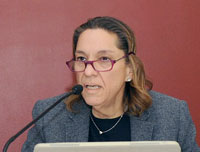
Zeynep Bodur Okyay,
ICI President of Assembly
“Similar to previous years, one of the outstanding topics of 2016 was Türkiye’s capital inadequacy and saving rates, that is industrialists’ access to financial resources, Basically, companies had a hard time accessing financial resources due to lack of guarantee. The Economic Coordination Council made a stride with the decision to allow for TL 250 billion loan with the support by Credit Guarantee Fund. These incentives, offered particularly amid vulnerable economy and recessing domestic demand, go a long way to putting the economy on the right track. Meanwhile, a possible shortening of the application period is another indicator of how the access to finances is being facilitated. I wholeheartedly believe that the support to SMEs by the Credit Guarantee Fund led by İsmet Gergerli, esteemed General Manager, will cause our economy to move upward in the first months of 2017."
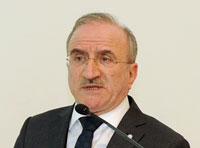
Sadık Ayhan Saruhan,
ICI Board Treasurer, read the
ICI 2016 budget realizations
Okyay, ICI President of Assembly, then invited ICI Chairman Erdal Bahçıvan to take the floor with his speech on the main agenda of the Assembly. Bahçıvan said that the readoption of production economy brings about a transformation in financing mentality. He illustrated his point by referring to many countries that came to empower credit guarantee funders to provide finances to producers. Bahçıvan pointed out that, to invest more, employ more, increase exports, manufacture high quality products with high added value, industrial enterprises need an easier access to finances.
Speaking of the results of the Central Bank’s Bank Loan Trends Survey, he said that banks exercise caution while lending to SMEs, on the grounds that they pose higher risks. Bahçıvan added that that the tightening policies on credit terms and conditions primarily targeted the “need for guarantee”, and according to him, the study revealed the key to the credit as the guarantee, and especially SMEs had a hard time finding finances.
Bahçıvan noted that the Credit Guarantee Fund had a pivotal role in the access of the real sector and industrialists, SMEs in particular, to the financial resources, and went on: “Although an over 20 year old organization, the CGF was far from fulfilling its potential until only recently. Now, there is a different, positive outlook. Recent reforms and strategies put in place render the CGF more and more effective, which please us, industrialists, to a great extent. It is necessary to deem the CGF as a leverage mechanism that strengthens the companies with potential or creates new opportunities, rather than a problem-solving mechanism that intervenes only after the emergence of a problem. Embracing this perspective would be one of the biggest revolutions in financing of the real sector and exporters.”

Bahçıvan continued his remarks:
“Through this perspective, we think it is critical that for Eximbank loans, which are predominantly used by our exporters, banks must shortly pass on the flag to the Credit Guarantee Fund in issuance of letter of guarantees. This practice must be implemented in the shortest time. We know that the CGF checks the candidate projects for loan guarantee for fundamental properties such as sustainability, feasibility, and job creation. It would be a visionary approach for CGF to additionally focus on strategically critical projects in different sectors and regions, in line with our developmental needs and to allocate its support accordingly.”
Describing 2016 as an economically challenging year, Bahçıvan said that this period was also marked by a spate of concrete efforts towards increasing production and invigorating economy, during which the CGF assumed key responsibilities and tasks. Reminding the significant CGF-related decisions taken at the Economy Coordination Council chaired by the Prime Minister Binali Yıldırım at the beginning of this month, he stated that increasing the Treasury’s involvement in CGF collaterals, raising suretyships, and adding non-SMEs to the system were significant steps. Bahçıvan said that they believed the CGF’s latest incentive announced by the Economy Coordination Council would deliver a leveraging impact on the economy.
Taking the floor next, İsmet Gergerli, General Manager of CGF, informed about the Turkish banking system and the restructured CGF. Revealing the Turkish banking sector’s credit size as TL 1.6 trillion, Gergerli said that SMEs and consumer loans used TL 400 billion each, and large enterprises, classified as non-SMEs, the remaining TL 800 billion. He expressed that given the Turkish banking sector has TL 1.3 trillion deposit and lends TL 1.6 trillion as loans, loan-to-deposit ratio totaled to 120 percent, which demonstrated that the banks used other debt instruments than deposits.

Speaking on the importance of “Breathing Loan”, Gergerli “I would like to extend my gratitude to chambers for their concern. The Breathing Loan made interest rates drop. The goal is to supply TL 5 billion credit to 80 thousand enterprises. Chambers and commodity exchanges are funded 7.5 percent instead of 10 to 11 percent, and the loans they are to lend create a downward pressure on interest rates. At CGF, we provide guarantee for 85 percent of the credits. This eliminates the risk premium. Banks highly value our guarantee. This powers up industrialists and the real sector to exert a downward pressure on interest rates, strengthening their bargaining position.
Gergerli Informed that the CGF was founded in 1991 and provided credit guarantee to 24 thousand enterprises over the 25 years of activity, which, totaled to TL 12 billion. He described CGF’s partnership structure, consisting of equal shares among TOBB, KOSGEB (Small and Medium Industry Development Organization), and banks. Explaining that they are a non-profit and non-public organization which has a public function, Gergerli stressed that they dream of a structure combining the real sector and the finance sector under a shared roof.
Gergerli continued as follows:
“We think about you, industrialists, as well as the banks. The stronger the banks are the bigger progress we can make. At CGF, we recently undertook a new mission. At the end of 2015, we had provided guarantee for TL 2.4 billion, which rose to TL 5.2 billion in the first 10 months of this year. With the new Cabinet, we made some changes. We introduced the term “non-SME” and started to provide guarantee to large enterprises in addition to SMEs. Non-SMEs opened a credit guarantee limit up to USD 50 million.”
Following his speech, ICI Assembly members took the floor and commented on the agenda items. İsmet Gergerli, CGF General Manager, repeatedly took the floor to reply each question of the Assembly members.
